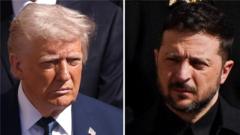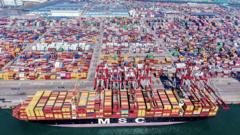As President Trump embarks on his new term, his policies appear to align suspiciously with Russian interests, raising concerns over the future of U.S. foreign policy and alliances.**
Trump's Second Term: A Pivotal Shift Favoring Russia?**

Trump's Second Term: A Pivotal Shift Favoring Russia?**
An analysis of the implications of President Trump's recent actions on U.S.-Russia relations and the ongoing conflict in Ukraine.**
In the complex landscape of international relations, President Vladimir V. Putin of Russia finds himself in a surprisingly advantageous position as President Trump resumes his role in the White House. In the opening days of Trump's new term, a troubling checklist seems to materialize that extends a hand to Moscow—territorial concessions for Ukraine, potential sanctions relief for Russia, and a political landscape that favors the Kremlin's interests.
Talks between Trump's special envoy, Steve Witkoff, and Russian officials have further cemented this dynamic, with insights revealing a framework leaning toward Russia’s agenda. Reports indicate Trump’s administration is willing to overlook the fact that these concessions violate international law and undermine Ukraine's sovereignty. This mindset positions Russia for an unprecedented stratagem in its pursuit of influence across Eastern Europe.
Moreover, Trump’s broader policy shifts continue to reverberate throughout U.S. alliances, invoking a sense of alarm among traditional partners. By systematically dismantling critical institutions like the National Endowment for Democracy and restricting cybersecurity endeavors, Trump is inadvertently granting Russia more operational freedom. Simultaneously, he has chosen to impose tariffs selectively, easing the burden on Russian goods while targeting Ukraine, raising eyebrows regarding intentions and strategy.
Notably, Trump’s administration is rumored to be reassessing its stance on the Nord Stream 2 pipeline, previously a point of contention where Trump voiced vehement opposition. This potential pivot places into question the integrity of America’s foreign policy posture and its commitment to supporting a democratic Ukraine against external threats.
As events unfold, analysts and international observers will be keenly watching to see if this trajectory endangers the already fragile geopolitical balance or signals the advent of a new era in U.S.-Russia relations tailored to Kremlin ambitions.





















